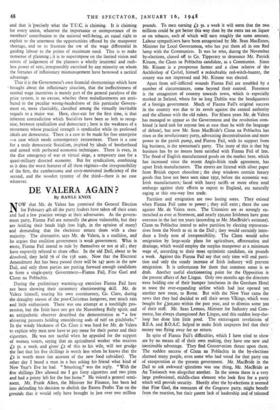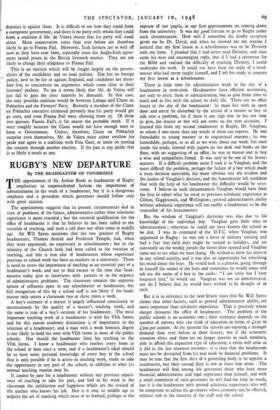DE VALERA AGAIN ?
- By RAWLE KNOX
NOW that Mr. de Valera has promised the General Election for February 4th all the party leaders have taken off their coats and had a few practice swings at their adversaries. As the govern- ment party, Fianna Fail are naturally the most vulnerable, but they are holding their heads high (too high, in the opinion of many) and demanding that the electorate return them with a clear majority. The alternative, says Mr. de Valera, is a coalition, and' he argues that coalition government is weak government. What is more, Fianna Fail intend to rule by themselves or not at all ; they have expressly refused to share office. In the old Dail, about to be dissolved, they hold 76 of the 138 seats. Now that the Electoral Amendment Act has been passed there will be 147 seats in the new Dail, and only three parties are putting forward enough candidates to form a single-party Government—Fianna Fail, Fine Gad and Clann na Poblachta.
During the preliminary warming-up exercises Fianna Fail have not been showing their customary electioneering skill. Mr. de Vakra himself, touring his own constituency, Co. Clare, during the draughty season of the post-Christmas hangover, met much rain and little enthusiasm. There was one attempt at a torchlight pro- cession, but the Irish have not got the Nuremberg Rally spirit, and an antipathetic observer described the demonstration as "a few shivering peasants holding smouldering sods of turf on pitchforks." In the windy bleakness of Co. Clare it was hard for Mr. de Valera to explain why men now have to pay more for their porter and their cigarettes. He was not tactful when he appealed for the support of women voters, saying that an agricultural worker who receives £2 5s. a week, and gives* £2 of this to his wife, will not grudge the fact that his five shillings is worth less when he knows that the £2 is worth more • (on account of the new food subsidies). The other day I heard a man in a bus asking his friend what kind of New Year's Eve he had. " Smashing,* was the reply. "With the five shillings Dev allowed me I got forty cigarettes and two pints and had a penny left for the bus home." He voiced a general senti- ment. Mr. Frank Aiken, the Minister for Finance, has been led into defending his decision to abolish the Excess Profits Tax on the grounds that it would only have brought in just over two million
pounds. To men earning £2 5s. a week it will seem that the two millions could be got better this way than by the extra tax on liquor or on tobacco, each of which will earn roughly the same amount Labour sympathisers have been antagonised by Mr. Sean MacEntee, Minister for Local Government, who has put them all in one Red lump with the Communists. It was he who, during the November by-elections, chased off to Co. Tipperary to denounce Mr. Patrick Kinane, the Clann na Poblachta candidate, as a Communist. Since Mr. Kinane is a prosperous farmer and a close relative of the Archbishop of Cashel, himself a redoubtable red-witch-hunter, the county was not impressed and Mr. Kinane was elected.
Apart from self-inflicted wounds Fianna Fail are troubled by a number of circumstances, some beyond their control. Foremost is the antagonism of country towards town, which is especially marked in Ireland, where for so long Dublin was the headquarters of a foreign government. Much of Fianna Fairs original success in the country was due to its revolt against the central authority and the alliance with the old rulers. For fifteen years Mr. de Valera has managed to appear as the Government and the revolution com- bined (a hard task for anyone less at ease than he with the language of debate), but now Mr. Sean MacBride's Clann na Poblachta has risen as the revolutionary party, advocating decentralisation and more power to the parish pump, and Fianna Fail, with its support from big business, is the townsman's party. The irony of this is that big business has by no means been satisfied with Fianna Fail of late. The flood of English manufactured goods on the market here, which has increased since the recent Anglo-Irish trade agreement, has upset Irish manufacturers. The streets are littered with silver paper from British export chocolate ; the shop windows contain luxury goods that have not been seen since 1931, before the economic war. Irish manufacturers; faced with heavy tariffs or more often total embargo against their efforts to export to England, are naturally raging at this one-way free trade.
Partition and emigration are two lasting sores. They existed when Fianna Fail came to power ; they still exist ; there the case against Mr. de Valera rests. The Unionists are as strongly en- trenched as ever at Stormont, and nearly 25o,00o Irishmen have gone overseas in the last ten years (according to Mr. MacBride's estimate). Clann na Poblachta intend to solve partition by electing representa- tives from the North to sit in the Dail ; they would certainly intro- duce a lively note of irresponsibility. The Clann would solve ' emigration by large-scale plans for agriculture, afforestation and drainage, which would employ the surplus manpower at a minimum wage of, according to their most optimistic candidate, six pounds a week. Against this Fianna Fail say that only time will end parti- tion and only the steady increase of Irish industry • will prevent emigration. It is unfortunate for them that common sense is so drab. Another useful electioneering point for the Opposition is the present affairs of Aer Lingus. Only two months ago the directors were holding one of their bumper luncheons in the Gresham Hotel to toast the ever-expanding airline which had just opened yet another new route, to Rome. But with the New Year came the news that they•had decided to sell their seven Vll(ings, which were bought for 4300,000 within the past year, and to dismiss some 300 of their staff. Mr. Sean Lernass, Minister for Industry and Com- ' merce, has always championed Aer Lingus, and this sudden loop-the- loop has done him little good. The extravagant revelations of B.E.A. and B.O.A.C. helped to make Irish taxpayers feel that their"' money was flying away for no return.
In spite of Fianna Fairs difficulties, which I have tried to show are by no means all ol their own making, they have one new and inestimable advantage. - They find Conservatism thrust upon them. The sudden success of Glenn na Poblachta in the by-elections alarmed many people, even some who had voted for that party out of exasperation at the Tresent government. Mr. MacBride in the Dail to ask awkward'qfiestions was one thing, Mr. MacBride as An Taoiseach was altogether another. In the towns there is a very large professional, middle-class element who look first for a party which will provide security. Shortly after the by-elections it seemed that Fine Gad, the remnants of the Cosgrave party, might benefit from the reaction, but their patent lack of leadership and of talented
deputies is against them. It is difficult to see how they could form a competent government, and there is no party with whom they could form a coalition if Mr. de Valera insists that his party will stand alone. More conservative votes than ever before are therefore likely to go to Fianna Fail. Moreover, Irish farmers are as well off now as they have ever been, especially since the Anglo-Irish agree- ment raised prices in the British livestock market. They are not likely to change their allegiance to Fianna Fail.
This is an election which will be fought largely on the person- alities of the candidates and on local politics. Eire has no foreign policy, save to be for or against England, and candidates are there- fore free to concentrate on arguments which come close to their listeners' pockets. To me it seems likely that Mr. de Valera will just fail to gain the clear majority he demands. In that case, the only possible coalition would be between L,abqur and Clann na Poblachta and the Farmers' Party. Recently a member of the Clain na Poblachta executive estimated privately that his party would get 4o seats, and even Fianna Fail were allowing them 25. Of these two guesses, Fianna Fail's is far nearer the probable mark. If it were roughly accurate the Claim would not have enough seats to form a Government. Unless, therefore, Claim na Poblachta surprise even themselves, Mr. de Valera must either swallow his pride and agree to a coalition with Fine Gael, or insist on putting the country through another election. If the past is any guide that is as likely a result as any.



































 Previous page
Previous page